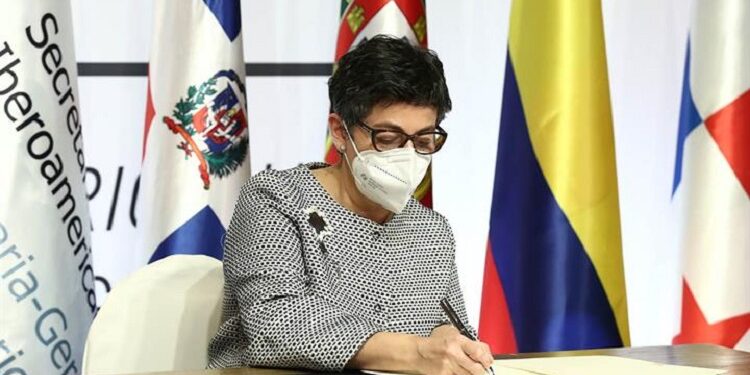The Diplomat
The Minister of Foreign Affairs, Arancha González Laya, and her counterparts from seven Latin American countries signed yesterday in Andorra the framework agreement for the Promotion of the Circulation of Talent in the Ibero-American Space.
The agreement is a binding document intended to create a legal framework to facilitate mobility and knowledge transfer, promote “innovation and harness creative, scientific and technological capabilities”, foster “economic growth and sustainable development” and promote the temporary movement of researchers, entrepreneurs, scientists, professionals and higher education students on internships.
The text was signed by the foreign ministers of Spain, Portugal, Dominican Republic, Guatemala (these four in person), Brazil, Colombia, Nicaragua and Panama (telematically) at the Sport Village Hotel in Soldeu, shortly before the start of the XXVII Ibero-American Summit in the same Andorran town. Precisely, the President of the Government, Pedro Sánchez, mentioned this agreement during his speech at the Summit, in which he affirmed that the agreement will be “very important for the economic recovery of our countries”.
The creation of a framework agreement was included, at Spain’s initiative, in the Declaration of the XXIV Ibero-American Summit, held in 2014 in Veracruz (Mexico) and in which the Ibero-American leaders urged the Ibero-American General Secretariat (SEGIB) to study its feasibility. At the XXVI Ibero-American Summit, held in 2018 in La Antigua (Guatemala), the Ibero-American countries took note of the Framework Agreement proposal and entrusted the SEGIB to convene a specific meeting of the competent authorities to advance in the negotiation of the said framework agreement. Finally, at the Andorra Summit, a final text adapted to the current pandemic situation was presented for signature.
The agreement remains open for signature by the rest of the Ibero-American countries until the end of 2022. The signatory countries, in addition to ratifying it in their respective parliaments, will still have to negotiate the specific agreements for the development of the new framework convention at a conference of states for which a date has not yet been set. These implementing agreements will have to establish the common conditions for carrying out the activities covered by the convention and define the requirements to be met, such as qualifications or experience, and will be adopted by a majority of the States Parties and will enter into force when at least three of them express their consent. The provisions of these agreements are compatible with the right of each State party to establish quotas or volumes of admission of foreigners.







